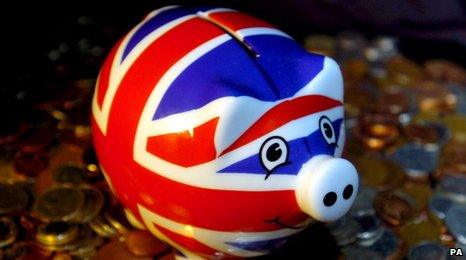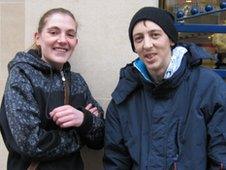It's a tale of two cities after UK's recession ends
- Published

The recession is officially over according to government figures, which means the British economy is growing again after 18 months of decline.
In that time more than a million people have lost their jobs, 50,000 homes have been repossessed and thousands of firms, large and small, have gone bust.
The worst might be over but the recovery is still expected to be long and hard for everyone.
How quickly the jobs market and the economy in general bounces back will depend on where you live in the UK, with some towns and cities likely to perform much better than others.
BRIGHTON: Top of the Class
Researchers at the organisation Centre for Cities named places like Brighton, Edinburgh, Cambridge, Milton Keynes and Reading as the most likely to bounce back quickly from the recession.
All five are predicted to do well because they have a large number of private businesses, and also a highly skilled workforce with jobs on offer to suit them.

Rosy says people move to Brighton and never want to leave the city
However, the recovery is still slow for some.
"My brother has a degree in music and humanities. He found it really hard to get a job when he first moved here, but now he works in KFC," said Rosy, aged 24.
"Brighton's like a bubble. You come here and you don't want to leave because it's got everything."
Today's figures show hotels and shops are starting to do better, both of which are important parts of Brighton's economy.
Claudia runs a gift shop in the North Laines area. She said: "I decided to expand and take a risk. I've had sleepless nights over it, but people say they haven't got anything like our stores where they live."
Many shoppers think Brighton will bounce back quickly. As well as specialist stores, it is a popular tourist destination with plenty of bars, clubs and other attractions.
The pound has been falling, making places like this attractive to foreign visitors. Now that interest rates are low, people with good mortgage deals also have more money to spend when they visit.
NEWPORT: Likely to struggle
Other towns and cities are expected to do less well, at least in the short term.
Newport in south Wales was named, along with Barnsley, Burnley, Doncaster and Stoke, as one of the five places that will struggle to recover from the recession.

Katie says she doesn't feel that things are getting any better
All have suffered over the last 18 months with unemployment rising more quickly than the UK average.
The latest figures for Newport show 6,000 are now looking for a job out of a population of 85,000.
"It's been really tough over the last year," said 24-year-old Katie who is queuing outside the local job centre. "You need experience and qualifications to get a job and I just haven't got them.
"It doesn't feel like we are coming out of the recession to me. It still feels the same as it did a year ago."
One in six of the working age population in Newport has no formal qualifications at all.
The city has a low number of brand new companies compared with the British average.
Around half the shops around the main square are boarded up or closed down with for ale signs in the windows.
Newport also relies heavily on public sector or government jobs in areas like healthcare and council work.
Politicians from all parties admit they will have to cut government spending after the next election.
That means fewer jobs are likely to be created in the public sector in the future.
- Published14 September 2009
- Published15 July 2009
- Published15 July 2009